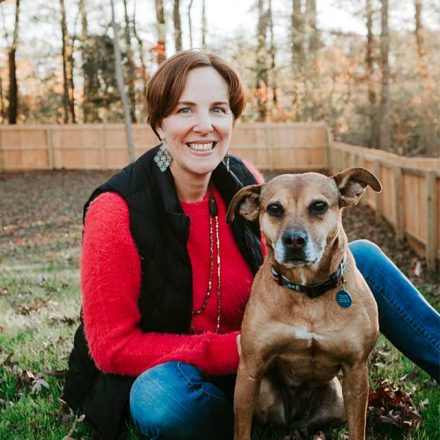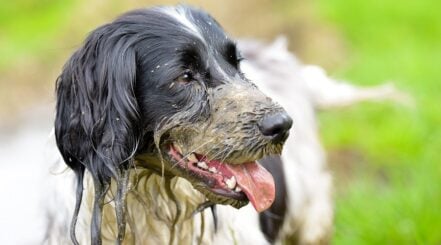If you’re new to dog ownership, there’s something you need to know about puppies – they have very sharp teeth, and they’re not afraid to use them!
Although the habit of mouthing everything in sight may be amusing to begin with, you and your family will quickly become tired of getting bitten. If biting is not nipped in the bud early, it can develop into a bad habit that could be potentially very dangerous, especially if you have young children or vulnerable people living in your household.
In this article, we look at why puppies bite and how you can stop the habit. We also give you some top tips on how you can keep your family safe from being bitten by an overexcited puppy or aggressive adult dog.
Why Do Puppies Bite?
Just like human babies who use their hands to check out what’s around them, puppies explore their world with their mouths. However, unlike human babies, puppies have needle-sharp teeth that can inflict a painful bite. That’s a potentially dangerous problem if you have young kids or a baby in your household.
Biting is also a way of establishing a hierarchy within a litter of puppies. The biggest and strongest pups tend to get more attention and food from their mother, and they often use their teeth to further assert their dominance over weaker, smaller siblings.
Teething Timeline
- At the age of around three weeks, your puppy’s baby teeth begin to erupt, and he starts teething.
- By six weeks of age, all your puppy’s baby teeth have erupted.
- At around 12 weeks, your puppy’s baby teeth begin to fall out and are replaced by his adult teeth.
- When your puppy is six months old, all his permanent teeth will have erupted, and his baby teeth have all fallen out.
So, from the age of three weeks, your fingers, toes, ears, and nose are all at risk of a painful mauling from your puppy!
It Starts With Puppyhood
So, how do you teach your puppy not to bite people? Teaching your puppy not to bite starts from the moment his baby teeth appear.
When teaching your puppy not to bite people, you aim to discourage undesirable biting behavior and encourage the response that you want your puppy to exhibit. That’s not going to happen overnight, and you will need to be patient, consistent, and persistent.
Here are some top tips that you can use to train your puppy not to bite:
First of all, you can discourage your puppy by loudly yelping when he nips you. Let your hand or foot go limp and withdraw from the game for a moment or two. Take care not to snatch your hand away, as your puppy might misunderstand and think that’s a game.
Make a fuss of your puppy if he stops stop playing or licks you, and then resume your game. That approach works quite well because your puppy will understand that his nip was painful. Effectively, you’re “talking puppy!”
When your puppy nips you, remove your hands and tuck them well away from him. Ignore your puppy for half a minute or so, and then resume gentle play. If your puppy plays nicely, reward him with lots of cuddles, praise, and maybe some treats.
Remember that your puppy is teething, so he will need to bite and chew on something. Give your puppy a selection of toys that are specially designed for chewing as an alternative to people’s hands and toes!
When choosing a selection of toys, be sure to pick those that are specially designed for chewing, and be sure to remove any that begin to disintegrate under the onslaught of sharp teeth!
When your puppy goes to bite you, withdraw your hand or foot, and offer him a durable toy or chew treat instead. While your puppy is happily gnawing on his toy or treat, pet and praise him.
Breaking the Habit: Tips
- Make sure that everyone who has contact with your puppy is playing by the same rules. You must be consistent in your training; otherwise, your puppy may become confused.
- Always be patient. Remember that your puppy is only exhibiting a natural behavior and won’t understand what he’s doing wrong.
- Never lose your temper with your puppy when he nips you. Shouting at or scolding your puppy won’t stop him from biting. Your pet will not understand why there’s a problem, and he could become more aggressive through fear.
- Don’t use your hands or feet to play with your puppy. That might sound obvious, but it’s incredible how many people do just that, and then wonder why they get nipped. Be sure to tell other people to follow your lead and stick with using a toy for playtime.
- Also, it’s best to avoid allowing your puppy to lick your face. Noses and ears can make prime targets for puppies’ teeth, and that hurts!
- Be selective in the choice of games that you play with your puppy. Although tug-of-war is excellent fun, any game that involves lunging, biting, and pulling can encourage nipping, especially if your pup gets overexcited during the game.
Staying Safe Around a Puppy
- Puppies are adorable, and naturally, kids love to play with them. Unfortunately, that can lead to biting accidents and injuries, especially to very young children and babies.
- Never leave your child alone with any dog, even a small puppy. If you need to leave the room, be sure to take either the puppy or the child with you.
- Older dogs might not appreciate the attention of a puppy that nips, and that could lead to fights and injuries. To maintain harmony in your home, you should allow just 20 minutes of free play every day, broken down into five-minute sessions, which must be closely supervised.
- Utilize a puppy crate to teach your puppy that he’s not allowed to pester his housemates, including people, other dogs, and cats whenever he feels like it.
- Kids and puppies must learn acceptable manners and boundaries. Don’t shout or scold either party. Take your time, show and encourage both your puppy and your children how to behave around each other.
- When playing with toys, encourage your puppy to play at floor level. Avoid encouraging your pup to jump up to reach the toy. When your puppy releases the toy, reward your pet by joining in another game or give your pet a treat to signal that playtime is over.
- The second you feel the puppy’s teeth on your skin, stop the game immediately, and allow the situation to calm down. Resume the game once your pup has chilled out. If your puppy has become overexcited, stop the game and put your pet in his crate for a nap.
Staying Safe Around Adult Dogs
According to a survey by the American Pet Products Association (APPA) for 2017-2018, 60.2 million U.S. households own at least one dog. That’s a lot of dogs!
Unfortunately, not all dogs are friendly, often because they were not properly socialized as puppies, or someone in the past has mistreated them.
Recent years have seen a worrying increase in the number of serious dog attacks on people, especially children. And the following statistics make concerning reading:
- In the U.S. alone, there are, on average, 4.5 million dog bites reported every year. Fortunately, most of these bites are minor, and medical attention is not required.
- From 2001 to 2016, it’s estimated that 5,473,893 people were treated in Emergency Departments for injuries sustained from dog bites.
- During the same period, 91,244 patients required hospitalization as a result of a dog attack.
- During the period 2001 to 2016, hospitals reported a massive 139 percent increase in hospitalizations as a result of dog attacks.
- From 2005 to December 2018, 469 people were reportedly killed by dog attacks in the U.S.
- Over half of dog attack fatalities occurred in children under the age of 10.
That’s a very sobering set of statistics.
So, how can you keep your family safe from dog attacks and biting? Well, teaching your family the correct way to approach a strange dog can go a long way to keeping them safe.
Why Adult Dogs Bite
Fear is a significant cause of biting. When a dog feels threatened or cornered, he responds by going into fight mode.
Some dogs are dominant and may become aggressive to assert their authority over their owner or other members of the dog’s human “pack” who are perceived by the animal as weak.
Dogs can be territorial, especially if their owner is not around. A stranger entering the dog’s domain can trigger an aggressive response. That includes dogs that are left alone in cars. Many dog bites happen when someone attempts to pet a strange dog through an open car window.
Many dog attacks occur as a result of a dog becoming overexcited during a play session. The red mist descends, and the dog’s instinctual attack mode kicks in. That situation is a common cause of serious mauling incidents, often involving kids.
Staying Safe Around Strange Dogs
Here are a few top tips on how to keep safe when you’re around a strange dog. Be sure to educate your family too!
- Before you touch the dog, let him approach and sniff you first.
- Don’t lean over a strange dog. That can make the dog feel crowded and threatened.
- Never approach an unfamiliar dog that is in a car, tied up, or confined in a backyard behind a fence. Dogs are naturally territorial, and your approach could be perceived as a threat.
- Don’t approach a dog while he’s sleeping, chewing a toy, eating, or caring for a litter of puppies.
- Always assume that any strange dog could view you as a potential threat.
- Many times, kids who have been raised with a dog in their household assume that every dog is friendly. Educate your children that they must be wary when meeting a strange dog. Often, kids who are over-friendly with an unfamiliar dog get bitten, especially if they try to hug or cuddle the dog.
Reacting to Dog Bites
So, what should you do in the worst case scenario if an aggressive dog approaches you?
- If a strange dog approaches you, keep still and let the dog sniff you. Usually, once the dog has decided that you’re not a threat, the animal will most likely walk away.
- Whatever you do, don’t run away! Dogs are natural hunters, and will immediately chase and potentially bring down a “prey” animal that’s running from them.
- Dogs regard direct eye contact as a threat. When confronted by an aggressive dog, avert your eyes so that you can keep track of the dog’s movement and body language but avoid direct eye contact.
- If the dog does attack you, use anything you have on hand to put between you and the dog to create a shield from snapping jaws. That could be your jacket, your shopping bag, your bicycle, or anything else you have handy.
- Don’t scream or yell at the dog. The dog could construe that as a display of aggression from you, which could trigger an attack.
- When the dog has lost interest in you, back away very slowly, keeping a close watch on the dog’s body language, and remove yourself from immediate danger as quickly as you can.
- As a final resort, fall to the ground, curl up into a ball and use your hands to protect your neck and your head. Keep completely still until the dog loses interest in you and wanders away.
The best way to avoid getting bitten or attacked by a dog is not to put yourself in danger in the first place.
Avoid entering a property where dogs are running loose. If possible, call the owner first and have him contain the dogs so that you can visit safely.
Final Thoughts
A well-socialized puppy that’s trained to play nicely without using his teeth on human flesh will grow into a well-balanced adult dog who’s safe to be around. Follow our tips to teach your pup not to nip and be sure to take him to puppy socialization classes as soon as he’s old enough.
Be sure to teach your kids and other family members the correct way to approach and handle strange dogs, including puppies. That will ensure that your family can continue to enjoy being around man’s best friend without any misunderstandings that could result in a bite.






I have 6 months puppy he still bites every time we play.
Instead of reaching to get the toy he jumps to get my hand.
My husband keeps saying he teething why he bites every thing.
He also is bad to destroy his toys like find it has weak spot he goes after it till it rips.
How to I handle this is is a puppy 6 month pomeranian